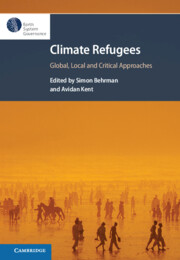Book contents
- Climate Refugees
- Series page
- Climate Refugees
- Copyright page
- Contents
- Contributors
- Acknowledgements
- 1 An Alternative Introduction: An Interview with the Editors, Which Never Took Place
- Part I Global Governance
- Part II International Law
- Part III Regional and Local Perspectives and Solutions
- 9 Climate Migration and Its Inclusion in Mexican Legal and Political Frameworks
- 10 Integrating Climate-Induced Mobility in Climate and Migration Policies in Brazil
- 11 Climate Displacement and Community-Led Solutions
- 12 ‘Climate-Displaced People’: A Small Island Developing States Perspective
- 13 Any Port in a Storm? Climate, Mobility, and Choice in Pacific Small Island Developing States
- 14 The Role of Environmental Disasters in Asylum Cases: Do German Courts Take Disasters into Account?
- 15 Building Governance Resiliency: Lessons from the United States
- Part IV Critical Approaches
- Index
15 - Building Governance Resiliency: Lessons from the United States
from Part III - Regional and Local Perspectives and Solutions
Published online by Cambridge University Press: 01 April 2022
- Climate Refugees
- Series page
- Climate Refugees
- Copyright page
- Contents
- Contributors
- Acknowledgements
- 1 An Alternative Introduction: An Interview with the Editors, Which Never Took Place
- Part I Global Governance
- Part II International Law
- Part III Regional and Local Perspectives and Solutions
- 9 Climate Migration and Its Inclusion in Mexican Legal and Political Frameworks
- 10 Integrating Climate-Induced Mobility in Climate and Migration Policies in Brazil
- 11 Climate Displacement and Community-Led Solutions
- 12 ‘Climate-Displaced People’: A Small Island Developing States Perspective
- 13 Any Port in a Storm? Climate, Mobility, and Choice in Pacific Small Island Developing States
- 14 The Role of Environmental Disasters in Asylum Cases: Do German Courts Take Disasters into Account?
- 15 Building Governance Resiliency: Lessons from the United States
- Part IV Critical Approaches
- Index
Summary
Using climate-induced displacement in the United States as an example, this chapter puts forth ideas that climate change resiliency, which has primarily focused on impacts to social-ecological systems, should be expanded to include ‘governance resiliency’ – the resilience of governance itself, or the processes through which impacts and effects are managed. Climate change governance has largely focused on spatial relationships, including vertical, multi-layered ones from the local to international levels, and horizontal relationships among various governmental and non-governmental actors. With effects as prevalent, long-lasting, and regressive as those arising from climate change, however, this spatial approach lacks two governance dimensions: the temporal, and the more imperceptible structural dimension, which is connected to systemic marginalisation commonly associated with inequality, poverty, and discrimination. The chapter analyses the spatial, temporal, and structural dimensions together through five fact scenarios that consider sudden and gradual changes as well as decisions not to govern. In considering such multidimensional governance and the scenarios, this chapter argues that transformative governance, or what we refer to as transformative resiliency, is required to address systemic inequities and to achieve sustainable governance resiliency.
Keywords
- Type
- Chapter
- Information
- Climate RefugeesGlobal, Local and Critical Approaches, pp. 277 - 298Publisher: Cambridge University PressPrint publication year: 2022



